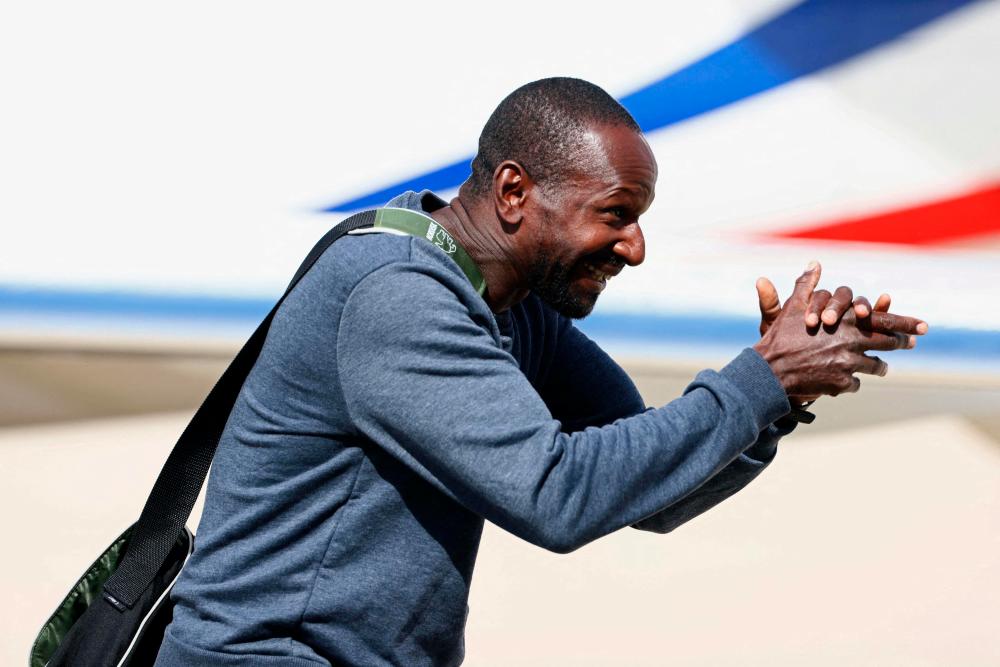NIAMEY: On Monday, French and US hostages Olivier Dubois and Jeffery Woodke were freed in Niger after many months in the hands of Sahel jihadists.
Their release, like others before it, has been shrouded in mystery and raised a number of questions.
Here are some answers.
How did the release unfold?
On his flight home to France on Tuesday, journalist Dubois, who was kidnapped in 2021 in northern Mali by the Al-Qaeda-linked Group to Support Islam and Muslims (JNIM), told AFP that his guards had informed him on March 7 that he would be released.
On March 16, he was taken by motorbike and then by pick-up truck to the region of Kidal in Mali.
There he was joined by Woodke, an aid worker kidnapped in 2016 in Niger.
According to the Liberation newspaper, the two men were then taken across the border into Niger in trucks before being picked up by a military jumbo jet and taken to the airport in the capital Niamey.
How was their release secured?
Hostage releases are usually shrouded in secrecy.
Dubois said he knew “nothing at all” about how his release was secured.
“I know that our discretion is sometimes not appreciated”, said French Foreign Minister Catherine Colonna. “But this condition ensures effectiveness.”
Niger’s Interior Minister Hamadou Souley, who was at the side of the two former hostages on Monday, thanked “French and American partners for their constant cooperation”.
US Secretary of State Antony Blinken had visited Niger -- an ally of France and the United States -- in mid-March.
The ongoing fighting between JNIM and the Islamic State organisation may also have worked in the hostages' favour.
Hostages can become a burden for groups that must frequently move around and evade tracking, said Ousmane Diallo, a Sahel researcher for Amnesty International.
“In the context of competition with another armed group, but probably also because of the reduction of negotiation channels, getting these hostages released may have been opportune,“ he said.
The rivalry may also have meant that JNIM was in need of money.
Was there a ransom or a bargaining chip?
French authorities have always denied paying ransoms.
However, President Francois Hollande acknowledged in a book published in 2016 that ransoms had been paid for the journalist Florence Aubenas, who was kidnapped in Iraq, as well as Herve Ghesquiere and Stephane Taponier who were kidnapped in Afghanistan.
In 2020, kidnapped Frenchwoman Sophie Petronin, two Italians and a Malian politician were freed in Mali. That was followed by the release of 200 prisoners, including a number of jihadists.
As for Dubois and Woodke, Diallo said, there was “obviously no release of prisoners”, but it is possible there was a financial transaction.
“Ninety-five percent of hostage-taking is for criminal motives, for which you have to pay up”, Alain Chouet, a former French intelligence official, told AFP.
“The prices have risen considerably over the last 20 to 25 years,“ he added, suggesting the current price is about $10 million, compared to $1 million previously.
What roles did Niger and Mali play?
Officially, authorities in Niamey have remained discreet.
But one Nigerien official, speaking to AFP on condition of anonymity given the sensitivity of the subject, said “it was Niger that led the operation from start to finish, with the personal involvement of President Mohamed Bazoum.”
French authorities also highlighted the help Niger provided.
“The French do not want to show that they are negotiating with jihadist groups”, another Niger official said.
Mali's ruling junta, which has cut most ties with France, has remained silent.
But the operation obviously took place in part on Malian territory.
Large swathes of Mali's border with Niger are beyond the junta's control.
Which intermediaries were used?
Hostage releases depend on intermediaries that are able to approach armed groups.
JNIM is led by Iyad Ag Ghaly, a Tuareg leader from Kidal who belongs to the Ifoghas tribe.
All eyes are on this community, which is present in both Mali and Niger.
A Nigerien source familiar with the negotiations said the prominent Ifoghas Mohamed Akotey may have played a role.
In the 2010s, he helped secure the release of employees of the French companies Areva and Satom, who were kidnapped in Niger.
“In my time, there were several channels of negotiation in Niger with different groups, clans and tribes through a number of local businessmen, who are obviously not disinterested”, Chouet, the former French intelligence official, said.
“These networks are maintained in Niger as well as in Chad and elsewhere.”
The Tuareg Ahmada Ag Bibi -- a former member of a jihadist group who has served several times as a member of parliament, and who acted as an intermediary in the release of hostages in Mali in 2020 -- told AFP he had not participated in the latest negotiations. - AFP









